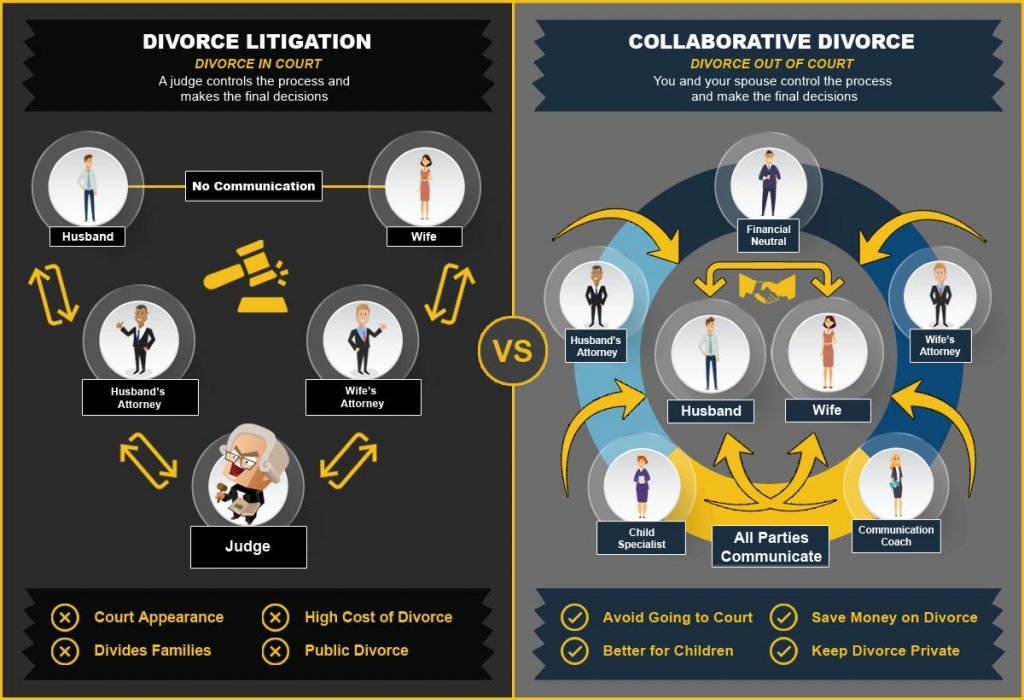Benefit of Collaborative divorce & its definition:
Collaborative divorce is a way to settle divorce issues through negotiation and collaboration with your spouse and other professionals without going to court.
benefits of collaborative divorce: Collaborative divorce process.
Many people ask about collaborative divorce, but most don’t understand the details involved in the process. With collaborative divorce, you and your spouse are each working with your own, independent attorney. There may also be other experts included in the process such as mediators, financial advisors and mental health professionals. The distinguishing feature of collaborative divorces is that all parties and the attorneys must sign a contract called a participation agreement in which everyone agrees they will not file a court action for divorce before the case is fully resolved.
benefits of collaborative divorce: Collaborative divorce professionals must be specially trained.
In a collaborative divorce, it is common to involve more professionals than simply the attorneys. What type of professionals you might want to include in your case depends on your specific set of circumstances. If one or both of you feels that you may benefit from someone being present for additional emotional support, you may want to include a therapist or counselor. If there are complicated financial issues, you may want to engage an accountant or financial planner. Of course, you will also each be represented by an attorney in this process. What all of these individuals will have in common is that they must have been trained in collaborative divorce to participate in the process. Therefore, if you decide that you want to proceed with a collaborative divorce, be sure that you retain a collaboratively trained divorce attorney.
If the collaborative process fails, you must start over with new attorneys.
The biggest drawback of collaborative divorce is that if the collaborative divorce process fails – meaning that you are unable to reach a resolution to your case – you need to start over with new attorneys. This means that you cannot simply have your collaborative divorce attorney move ahead with litigation by filing a complaint for divorce. Each party must then hire entirely new attorneys to represent them.
Cost of collaborative divorce
Due to the fact that additional individuals, such as counselors and financial planners, are required for the process, a collaborative divorce may result in being more costly. You will likely need to pay a retainer – or at the very least, the hourly rate – for all individuals who are involved in the case. In most non-collaborative divorce cases, you pay just for your attorney’s time and perhaps an expert if it’s determined that one is needed.
Benefits of Collaborative Divorce
- Commitment. When you embark on the collaborative process with your spouse, you are both committing to resolving your divorce amicably through a negotiated settlement and to avoid litigation where a court would decide your future. There are obvious benefits to this type of dispute resolution as it allows the parties to craft a settlement that works best for them, rather than having a settlement imposed on them by a judge.
- Transparency. There is a free flow of information and communication between the parties, the lawyers and any other experts involved. Nothing is hidden. The parties have to believe that their spouse has inherent integrity to participate in the collaborative process truthfully and with candor.
- Efficiency. As with mediation, negotiations are immediate and done face to face. This type of communication speeds up the process of divorce over conventional divorce litigation. This also provides the parties and the attorneys to address issues that come up right away rather than letting things fester and get out of hand.
benefits of collaborative divorce: Collaborative divorce vs. traditional divorce
In a collaborative divorce, you, your spouse and each of your attorneys are signing a written contract that you will settle all issues in the divorce without going to court. With traditional divorce, there is no such commitment being made to one another. With traditional divorce, you are represented by an independent attorney, but you are not bound to stay out of court if court action becomes necessary. If your divorce is high conflict, if your spouse cannot be trusted to be forthcoming and transparent with information, if there is a domestic violence or substance abuse issue in your relationship, then collaborative divorce may not be a good choice for you.
benefits of collaborative divorce: NJ collaborative divorce professionals
New Jersey Collaborative Divorce Professionals is a professional organization that brings together different professionals that are collaboratively trained to foster the growth of collaboration as a means of dispute resolution.
The attorneys at DeTorres & DeGeorge Family Law have certifications in collaborative divorce to assist you in resolving your case. Give us a call today to learn more about the benefits of collaborative divorce.

 START LIVE CHAT
START LIVE CHAT










